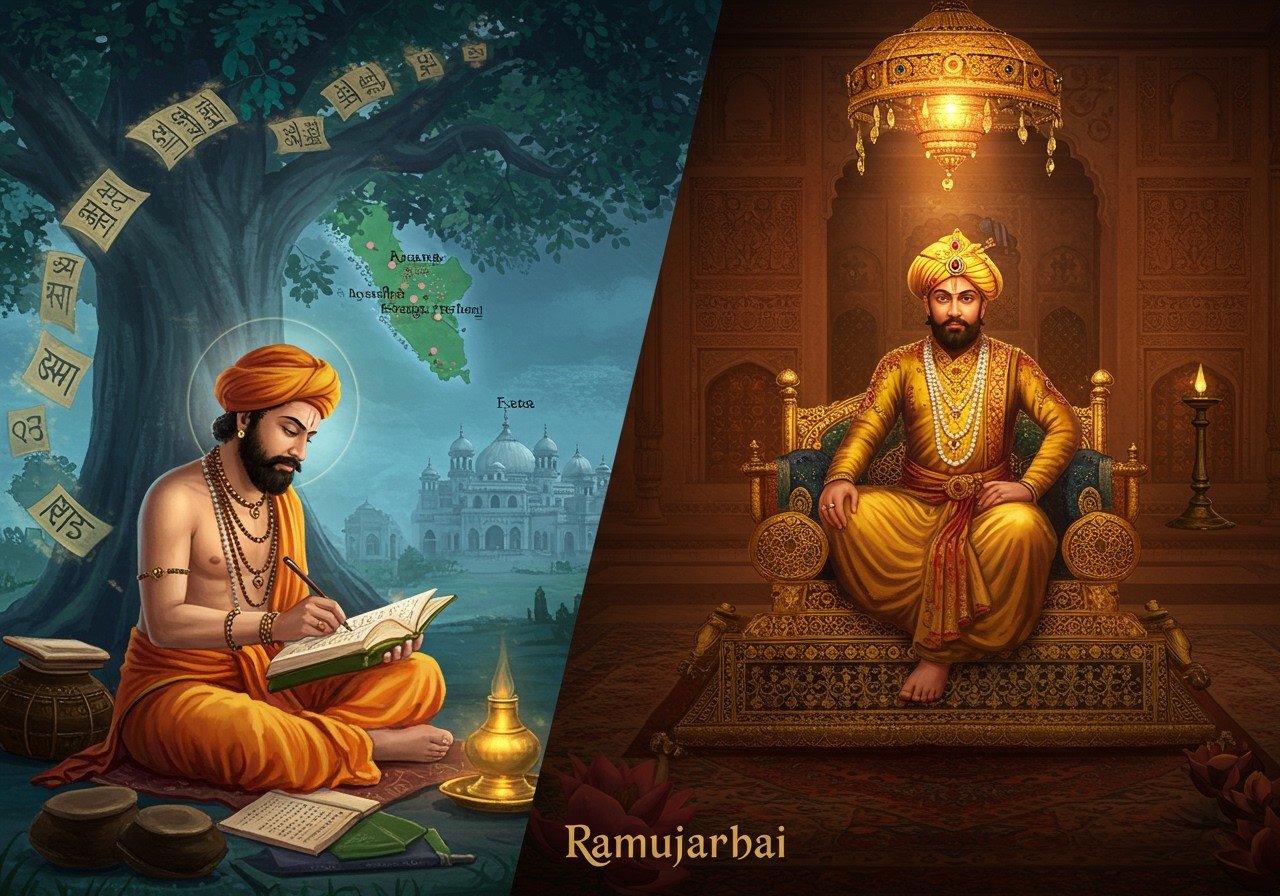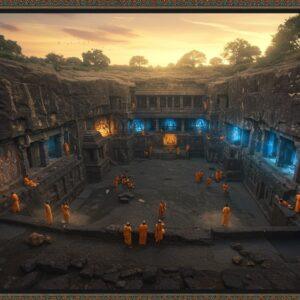
Tulsidas and Akbar, two prominent figures of 16th-century India, lived during a period of immense cultural and spiritual dynamism. Tulsidas, a revered poet-saint, commenced his magnum opus, the Ramcharitmanas, in 1574. Simultaneously, Akbar, the Mughal emperor, ruled from 1556 to 1605, an era known for his endeavors to foster religious harmony. The possibility of their paths crossing adds another layer of intrigue to their already captivating stories.
Contemporaries in a Transforming India
Both Tulsidas and Akbar played pivotal roles in shaping the socio-cultural landscape of their time. Tulsidas’s spiritual writings and Akbar’s pursuit of religious tolerance marked a unique period in Indian history. They lived during a time of both confluence and conflict between Hinduism and Islam. Akbar’s policy of Sulh-i-Kul, promoting universal peace, provided a unique context for their possible interactions.
Tales of Encounters and Divine Intervention
Stories abound about potential meetings between Tulsidas and Akbar. One account places them in Kashi (Varanasi) around 1590. A painting in the Jaipur Museum seems to depict them in conversation on boats, adding a visual element to these narratives. This visual representation further fuels the intrigue surrounding their possible relationship. Learn more about spiritual journeys and historical significance.
Another narrative highlights Tulsidas’s friendship with Abdur Rahim Khankhana, a celebrated poet in Akbar’s court and one of his “Navaratnas” (nine jewels). It’s believed this connection could have paved the way for a meeting between the two figures. Some historical accounts suggest that Akbar even extended his protection to Tulsidas, shielding him from orthodox Sanskrit scholars who criticized his choice of Awadhi, a vernacular language, for the Ramcharitmanas instead of the more classical Sanskrit. This act of patronage speaks volumes about Akbar’s respect for diverse expressions of faith.
The Imprisonment Narrative
A popular story narrates Tulsidas’s imprisonment by Akbar. When summoned to court and asked to perform a miracle, Tulsidas, steadfast in his devotion to Lord Rama, refused. This act of defiance led to his confinement. Legend has it that during this imprisonment, he composed the Hanuman Chalisa, a powerful hymn dedicated to Lord Hanuman. As the story goes, a divine intervention in the form of an army of monkeys wreaking havoc in Fatehpur Sikri led to Akbar’s realization and subsequent release of Tulsidas, coupled with a sincere apology. Browse our exquisite collection of handcrafted wooden masks to bring a touch of tradition to your home.
The narrative further claims that Akbar, deeply moved by the experience, issued a firman (royal decree) to safeguard the followers of Rama, Hanuman, and other Hindu deities from any form of harassment within his kingdom. While historical evidence supporting this incident remains elusive, the story itself reveals much about the cultural and religious dynamics of the era. You can also explore our range of holy books and holy clothing.
Separating Myth from Reality
The stories surrounding Tulsidas and Akbar blend elements of myth and history, offering a glimpse into the complexities of the time. While their factual accuracy is debated, these narratives remain powerful symbols, reflecting societal challenges and the Bhakti movement’s stand against oppression. These stories offer a rich tapestry of cultural and spiritual significance, highlighting the challenges and triumphs of faith.
Enduring Legacies
Regardless of the exact nature of their interactions, both Tulsidas and Akbar left enduring legacies. Tulsidas’s Ramcharitmanas continues to be a source of spiritual solace and inspiration for millions. Akbar’s policies shaped the course of religious tolerance in India, influencing generations of rulers. Their contributions serve as a testament to their impact on art, culture, and society. Learn more about enduring influences and legacies.
FAQs on Tulsidas and Akbar: A 2025 Historical Perspective
What defined the relationship between Tulsidas and Akbar? A sense of mutual respect appears to have marked the relationship between the Mughal Emperor Akbar and the poet-saint Tulsidas. Despite differing religious backgrounds, Akbar admired Tulsidas’s wisdom and literary achievements.
Did Akbar influence Tulsidas’s writings? Akbar’s influence on Tulsidas’s work seems unlikely. Tulsidas’s focus on Hindu traditions and the teachings of Rama suggests an independent spiritual pursuit. However, the atmosphere of religious tolerance fostered by Akbar’s reign undoubtedly allowed such works to thrive.
Why was Tulsidas imprisoned? Accounts suggest that Tulsidas was imprisoned for refusing to offer praise to Emperor Akbar, prioritizing his devotion to Rama. This defiance led to his brief incarceration.
What was the social and political climate of Tulsidas’s era? Tulsidas lived during the Mughal rule in India, a time of significant cultural exchange. Akbar’s reign was particularly noted for its emphasis on religious tolerance amid a diverse society.
What is Tulsidas’s literary legacy from Akbar’s time? Tulsidas’s most enduring contribution is the Ramcharitmanas, a retelling of the Ramayana in the vernacular Awadhi language. This work made the epic accessible to a wider audience, promoting devotion and righteousness.
Did Tulsidas and Akbar ever meet face-to-face? Historical records do not definitively confirm a personal meeting between the two. Their relationship carries a stronger symbolic meaning, representing the convergence of diverse cultural and religious perspectives during that period.
How did Akbar’s reign affect Tulsidas’s life and works? Akbar’s tolerant rule gave Tulsidas the freedom to pursue his spiritual and literary work without fear of persecution. This supportive environment allowed arts and literature to flourish.
For all your pooja needs and to connect deeper with your traditions, visit poojn.in for flammables, decoratives, branded items, and more. You can even find beautiful Rakhis and wedding items for upcoming celebrations.


